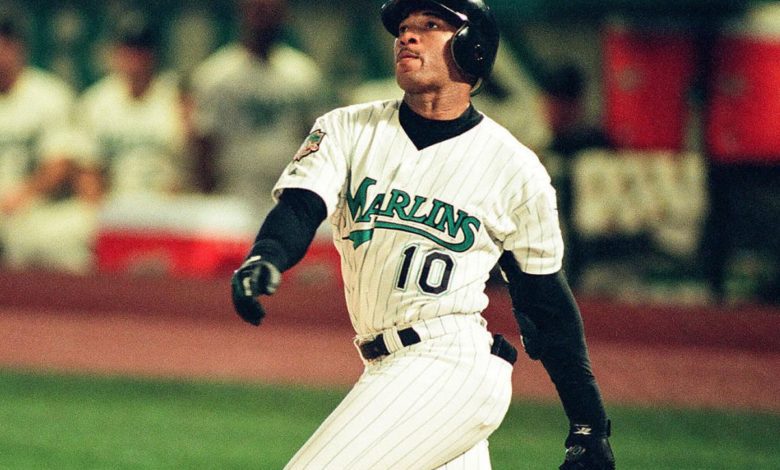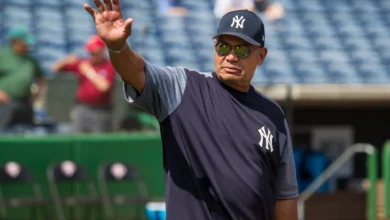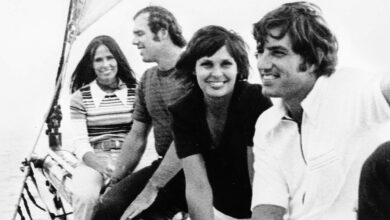
Gary Sheffield belongs in the Hall of Fame.
In his prime, Gary Sheffield was one of the most feared hitters in baseball. Establishing a rare blend of power and speed, Sheffield could do it all. Pulling the ball for a long homer, or slapping the ball into the opposite field for a single and then stealing a base, Sheffield was a terror to opposing teams. In another era, Sheffield probably would have been a slam dunk hall-of-famer at this point. But thanks to the Steroid Era pileup on the ballots, Sheffield and many others have been stuck in a limbo. That being said, Gary Sheffield has a good a case as any for entry into the Hall of Fame. Let’s take a look back on Sheffield’s career and see if he’s truly worthy of the Hall of Fame.
The first step on this test is career longevity. Any good hall-of-fame case generally has a long career around the game to back it up. Sheffield has exactly that. Debuting in 1988 with the Milwaukee Brewers, Sheffield played in 24 games that season before becoming a regular the following year. Sheffield played a total of 2,576 games across 22 seasons in the big leagues. Sheffield was a highly sought after piece during his big league stay. Sheffield saw time with the Brewers, Padres, Dodgers, Braves, Yankees, Tigers and Mets. But perhaps his best seasons came with the then Florida Marlins. Sheffield spent six seasons in Florida, and was a key part of the club’s 1997 World Series Championship roster.
The next step on this test is offensive production. Sheffield is well-regarded as a feared player in the box, but just how good was he? Very good. Sheffield ended his career with a .292 batting average over more than 10,000 at-bats. An outstanding number, especially for the era he played in. Sheffield wasn’t just a hits guy either. He finished with a .393 on-base percentage and a .907 OPS, meaning that Sheffield worked plenty of walks as well.
However, when Sheffield did connect on pitches, he usually did damage. Sheffield ended his career with 509 career home runs, becoming the 25th member of the illustrious 500 home run club. Sheffield also batted in 1,676 runs, good for 30th all-time. Other notable numbers for Sheffield include over 1,000 career extra base hits, over 1,400 career walks, over 2,600 hits and over 250 career stolen bases. To cap it off, if you averaged Sheffield’s career offensive stats into a 162 game sample size, you would end up with a .292/.393/.514 slash line with 32 homers, 105 RBIs, 93 walks and only 74 strikeouts. That’s MVP level performance on average.
With all of those accolades, it only makes sense for Sheffield to have gathered a lot of awards during his time in the big leagues as well. That he did. Sheffield ended his career as a nine-time All-Star, five time Silver Slugger, 1992 NL batting champion and 1992 Major League Player of the Year. Sheffield is also one of two players ever with a 30-homer season with five different teams. (Fred McGriff being the other.) Sheffield’s damage with the bat left him with an 80.7 offensive WAR, 36th all-time. His total WAR ended at 60.5, 181st all time.
In the field, Sheffield wasn’t winning Gold Gloves but was still a respectable outfielder. Across 2,212 games spent as a fielder, Sheffield finished with a .964% fielding percentage. A solid number even before including the fact that Sheffield started his career as a speedy shortstop before developing into a mashing corner outfielder. While he was never flashy, Sheffield could always be counted on to make a big play in the field, especially when his team needed him.
Despite his regular season success, Sheffield only played in 44 postseason games over six seasons. That being said, Sheffield was clutch when the pressure was on. Sheffield finished his postseason career with a .248 batting average, six homers, 19 RBIs, and 13 more walks than strikeouts. In the Marlins’ back-and-forth 1997 World Series seven game battle with the Cleveland Indians, Sheffield batted .292 with five RBIs and eight walks, a performance that culminated in his first, and only, ring. World Series championships are important factors in a hall-of-fame case, and while Sheffield only earned the one ring, his performance in that series and in the playoffs in general help cement his legend.
Of course, Sheffield’s case for the Hall of Fame can’t be fully examined without his inclusion in the famous Mitchell Report. Sheffield was one of the many names included in the report, citing that he had obtained and used steroids. His most glaring allegation being that, during a 2001 workout with Barry Bonds, Sheffield applied a cream that contained steroids. Sheffield claimed that he was unaware that the cream included steroids and had no reason to, and pointing to his numbers following the 2001 season as proof, claiming that his numbers did not improve. To his credit, Sheffield’s numbers do not show a glaring improvement following the 2001 season, and his alleged use of steroids has never been proven, but his inclusion in the infamous report causes some hesitancy on Sheffield’s case.
There’s no doubt that Gary Sheffield is one of the greatest players to ever play the game of baseball. His wacky batting stance was one kids around the world wanted to emulate. He ended his career as one of the most feared offensive players ever, and a respectable defender as well. The 2022 hall-of-fame ballot class will be Sheffield’s eighth. As per hall-of-fame rules, a player only has 10 tries before being dropped off the ballot. After starting at 11.7% in 2015, Sheffield climbed up to 40.6% in 2021. A sizable climb, but Sheffield is running out of time to reach the 75% threshold necessary for induction. With this being the last year on the ballot for guys like Bonds, Curt Schilling and Roger Clemens, the path to a clear induction for Sheffield in his final tries is there, but it’ll be a close call.
Of course, special committees like the Veteran’s Committee have the potential to induct Sheffield as well, but being inducted by the actual hall-of-fame voters is a special honor. Sheffield has the pedigree for the Hall of Fame, and the race involving his and others’ names over the next few years will be a fun one to watch.





